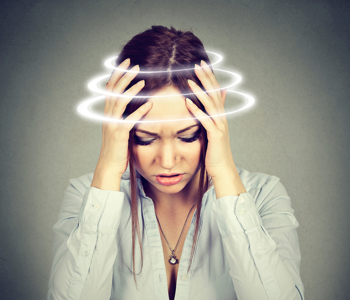Edmonton's experts in dizziness and balance disorders
Dizziness and vertigo are among the most common symptoms that send people to see their physician. Many vertigo and dizziness symptoms come from a dysfunction of the vestibular organ, which is a small but important structure in your inner ear.
See how much you know about vestibular health and take our "vertigo quiz" here to see how much you know about vertigo, and to see what can be done for you.
Vestibular disorders are common in the general population and often occur as a result of:
- Normal age-related changes (incidence of vestibular disorders increases with age)
- Neck trauma such as following a motor vehicle accident or concussion
- Ear infections or other infections, which affect the inner ear
- Other illnesses
- Stroke and/or brain injuries

Some common symptoms of vestibular disorders include:
- Dizziness
- Vertigo or a spinning sensation, which often relates to movement and/or position changes such as getting out of bed, rolling over in bed, etc.
- Feeling off-balance or a sensation of floating/waviness
- Nausea
- Light-headedness
- Vision problems such as blurry vision, limited screen tolerance, trouble with scrolling, reading, etc.
- Associated neck/upper back pain and sometimes headaches, which can indicate that the neck is a contributing factor (i.e. cervicogenic dizziness)
These symptoms may be felt with:
- Rolling in bed
- Bending over
- Looking up or down
- Moving from sitting to laying
REP Physio will complete a comprehensive assessment and implement effective treatment strategies to help relieve these symptoms at one of our Edmonton clinics.
Is Vertigo Affecting You?
Click or call to book an assessment. Dizziness doesn't have to be permanent.
or
What is the vestibular system?
The vestibular system consists of 3 components: the peripheral vestibular apparatus (located in the inner ear), the central processing system, and a system to generate motor output.
The vestibular system plays an important role in our ability to successfully complete “normal day to day” activities like walking through a busy grocery store, looking back and forth from one object to another, avoiding a fall after tripping, etc. Its function helps us to preserve clear vision/focus while our head and/or body are moving and to initiate compensatory limb and body movements in order to maintain postural stability.Can vestibular disorder be treated?
Fortunately, most conditions resulting in the symptoms listed above can effectively be treated with vestibular rehabilitation. Some conditions can fully resolve after 1-2 physiotherapy sessions, while others may require longer treatment and more specialized rehabilitation/multi-disciplinary care.
Vestibular Rehabilitation at REP Physio
Vestibular rehabilitation involves a subjective and physical assessment with a series of manual and functional tests to categorize the type of dizziness you’re experiencing. The therapist will observe symptoms such as irregular eye movement, issues with balance, poor visual tracking and subjective complaints of dizziness that may be linked to impaired vestibular function. Based on the results of the assessment, a treatment plan will be created.
Vestibular Rehabilitation can involve:
- education
- manual therapy
- head maneuvres
- patient-specific exercise program (habituation, adaptation, and visual exercises)
- balance and coordination retraining
Potential results from Vestibular Rehabilitation:
- partial or complete relief from vertigo and dizziness
- improvement in balance and coordination
- decrease risk of falls or clumsiness
- decrease involuntary eye movements
- improvement of sensory integration (vision and vestibular systems)
What can be treated by Vestibular Rehabilitation?
- Benign Paroxysmal Positional Vertigo (BPPV)
- Unilateral Vestibular Hypofunction (Vestibular Neuritis, Labyrinthitis, Acoustic Neuroma, Vascular Compromise, Trauma)
- Bilateral Vestibular Hypofunction (Ototoxicity, Bilateral Endolymphatic Hydrops, Age related degeneration)
- Central Vestibular Dysfunctions
- Post Head Trauma/ Concussion
- Migraine Related Dizziness
- Cervicogenic Dizziness
We are aware that many patients experiencing dizziness or vertigo often see multiple healthcare providers before receiving a diagnosis and starting the appropriate course of treatment. Our vestibular therapists are trained to assess and diagnose the most common vestibular impairments and can help further guide your care. They are also able to screen for more serious/urgent medical conditions. Do not hesitate to contact us, should you have any questions about vestibular rehabilitation.
